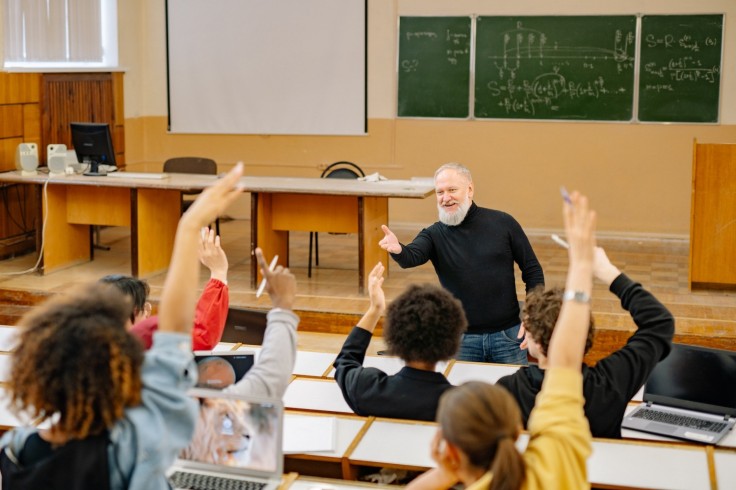Empowering Students: The Role of Public Speaking Skills in Fostering Effective Communicators
Created by
Your students individually stand in front of the class for a speech you assigned them to do. While the majority is doing well, you notice some students struggling, shaking, or forgetting everything they've prepared. These students may find public speaking challenging due to social anxiety disorder, lack of confidence, or stage fright.
Ignoring these issues won't help these students in the long run. As their teacher, you must help them overcome their public speaking challenges. They should start learning public speaking now so they won't struggle in adulthood and the real world.
Mastering public speaking for students can take time. Why is it important to teach this social skill, and how can you help your students become effective communicators?
The Significance of Public Speaking Skills for Students
Public speaking is a social skill that requires a positive and authoritative presence, an engaging tone, and clear thoughts. It is among the most compelling skills an individual can possess.
Let's examine the other reasons why public speaking skills are essential for students below.
Enhances oral communication skills
Public speaking is essential to harness students' oral communication skills. By giving them opportunities to speak in front of the class, you allow them to practice talking and presenting information to people.
The more they speak, the more they can build their communication skills. They may also adapt these skills into their daily conversations. Consequently, they can foster other skills, such as:
•The use of clear and concise language
•Professional tone
•Active listening
•Paying attention to the listeners' body language
Cultivates confidence and a positive self-image
Public speaking can help cultivate confidence and positive self-image in your students. Allowing them to speak their mind can empower them and their perceptions. Concurrently, if you give them positive feedback for doing well, they may feel more comfortable the next time you ask them to speak in front of the class.
Conversely, for students who didn't do well or got anxious, give constructive feedback to help them overcome their anxiety or stage fright. Don't give them reasons to fear you might shame them the next time.
Be patient by encouraging a learning environment where they can practice to feel more comfortable delivering and presenting themselves. This way, they can be more at ease, reinforcing a positive self-image.
Nurtures leadership skills and qualities
Leadership skills are valuable traits that can help students learn how to guide, inspire, and motivate other people. While not everyone wants to be a leader, public speaking can nurture leadership qualities that will benefit your students should they need to lead a team.
Public speaking involves persuasion that should keep the audience interested, which is crucial in leadership. When your students master public speaking, they can use it even with the simplest tasks-like group projects or meetings-that require a leader. It can help them transition to leadership roles with greater ease and confidence.
Furthermore, starting leadership training in college or high school can help them gain skills that will equip them to face challenges in the workplace.

Helps in overcoming fear and anxiety
If you don't address your students' public speaking issues, they'll likely become more afraid of speaking in front of larger crowds. Fortunately, you can help them overcome these fears with proper coaching and guidance.
The more you give your students public speaking opportunities inside the classroom, the more you can reduce and desensitize their fear of apprehension. Consequently, they can become comfortable with interacting with you and their classmates.
These interactions, in particular, should be filled with positive reinforcements to combat public speaking anxiety efficiently.
Fosters connections with peers
Some of your students may struggle to connect with their peers. This may hinder them from forming social relationships essential to their development.
Public speaking is a way to help these students build relationships with their classmates. When you guide them properly, you allow them to loosen up by speaking their thoughts clearly and engagingly. This way, they can be more comfortable interacting with their peers, helping them establish friendships.
For instance, when students finish their speech, they can be at ease when their classmates ask questions. They can answer them confidently and convey their message with a clear vision and explanation. If they connect with their classmates, they can connect with larger audiences.
Improves academic standing and performance
Public speaking skills can offer opportunities to assist your students in various academic areas. It can encourage analytical thinking because speech creation and delivery require reflection and analysis. It also promotes logic, critical thinking, memorization, research, and other academic skills they can use in their desired professions.
Suppose you assign your students to write an essay about a particular topic. Your students can apply the research and writing skills they've gained from creating speeches to their essays.
They'll know how to gather facts and information to support their arguments. Concurrently, they can articulate their thoughts clearly because they know how to write and revise their content, helping them improve their academic performance.
Promotes self-expression
Successful public speakers can create engaging stories that pique their listeners' attention. Your students can be the same when they plan, research, and write their speeches or presentations accordingly, letting them express their perceptions clearly and compellingly.
Additionally, public speaking can teach students how to assert their arguments politely and genuinely. It can also foster empathy to understand and appreciate diverse perspectives, helping them learn new insights from different experiences. Consequently, this can make your classroom activities more engaging and interactive.
Strengthen Your Students' Public Speaking Skills for Their Future
Teaching public speaking to your students requires patience and commitment. The ultimate goal is to help them overcome their fears and anxiety through engaging activities, constructive feedback, and providing more opportunities to practice.
When your students strengthen their public speaking skills, they can elevate their self-expression, social connections, and professional qualities essential to their future careers. With constant guidance and effort, your students can become effective communicators and will thank you for pouring your utmost support in the future.
© 2025 University Herald, All rights reserved. Do not reproduce without permission.








